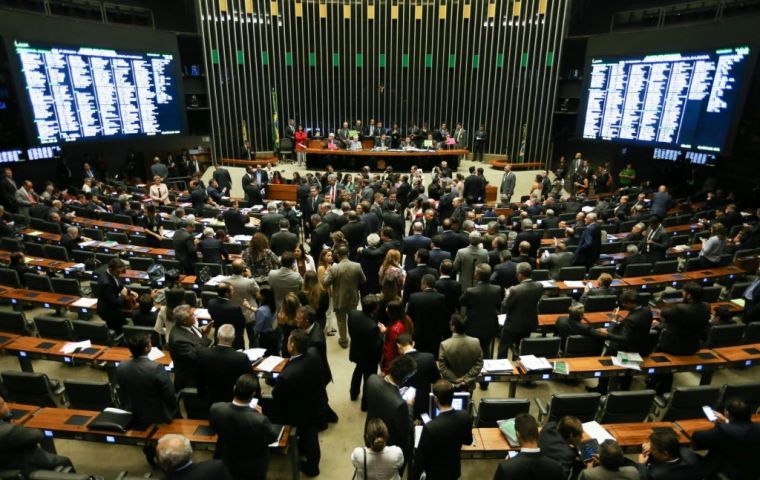MercoPress. South Atlantic News Agency
Brazil: Investors fearful of reaction to pension reform next steps in congressional debate
 Optimism over the Constitutional and Legal Affairs Committee’s vote by 48 to 18 votes approving the pension reform bill’s constitutionality quickly evaporated
Optimism over the Constitutional and Legal Affairs Committee’s vote by 48 to 18 votes approving the pension reform bill’s constitutionality quickly evaporated  The Bovespa stock market fell 0.9% to 95,045.43 points, while market interest rates and bond yields jumped. The yield on Brazilian 10-year bonds rose 11 basis points
The Bovespa stock market fell 0.9% to 95,045.43 points, while market interest rates and bond yields jumped. The yield on Brazilian 10-year bonds rose 11 basis points Brazilian markets slumped on Wednesday, a day after a planned pension overhaul cleared a congressional hurdle following a lengthy debate that highlighted the government’s struggle to build support for its signature reform policy.
The Real had one of its worst days of the year, falling through 3.99 per dollar for the first time in almost a month, bringing the psychological barrier of 4.00 within touching distance.
The Bovespa stock market fell 0.9% to 95,045.43 points, while market interest rates and bond yields jumped. The yield on Brazilian 10-year bonds rose 11 basis points, its biggest rise in a month.
Any optimism over the Constitutional and Legal Affairs Committee’s (CCJ) vote by 48 votes to 18 approving the pension reform bill’s constitutionality quickly evaporated as investors focused on the obstacles ahead rather than the one just cleared.
“After the government struggled to get the bill through the CCJ, markets are asking of the government: ‘Is that the best you can do?’” said Jose Francisco de Lima, chief economist at Banco Fator in Sao Paulo.
Unexpectedly bad March jobs data and tax revenue figures also added to concerns about Brazil’s sputtering economy, weighing on investor sentiment.
Jose Carlos Faria, head of Latin America Economic Research at BNP Paribas in Sao Paulo, said the CCJ vote keeps pension reform approval on track for October, with anticipated savings of only 500–600 billion reais over the next decade — far below the government’s 1.1 trillion reais (US$ 275 billion) target.
He noted four changes the CCJ made to the original bill, removing passages that would have: Advertisement
-tweaked rules for a worker severance fund; let the minimum retirement age be changed through ordinary legislation; directed litigation against the reform to a court in the federal district, ane d let the executive branch alone make further changes to the social security system.
None of the changes will dilute the bill’s fiscal impact — at least for now.
“It is likely to be a challenging process, with the reform diluted during the bill’s passage,” Faria wrote in a note on Wednesday.
The bill now goes to a special commission before proceeding to the lower house plenary, where it will need at least 308 votes in two rounds of voting to advance to the Senate.
Brazil’s spending on social security is among the highest in the world, and a radical overhaul is central to President Jair Bolsonaro’s economic agenda. However, cuts to pension benefits are a tough sell in Congress, and economic data suggests the economy is flagging, perhaps even shrinking.




Top Comments
Disclaimer & comment rulesCommenting for this story is now closed.
If you have a Facebook account, become a fan and comment on our Facebook Page!